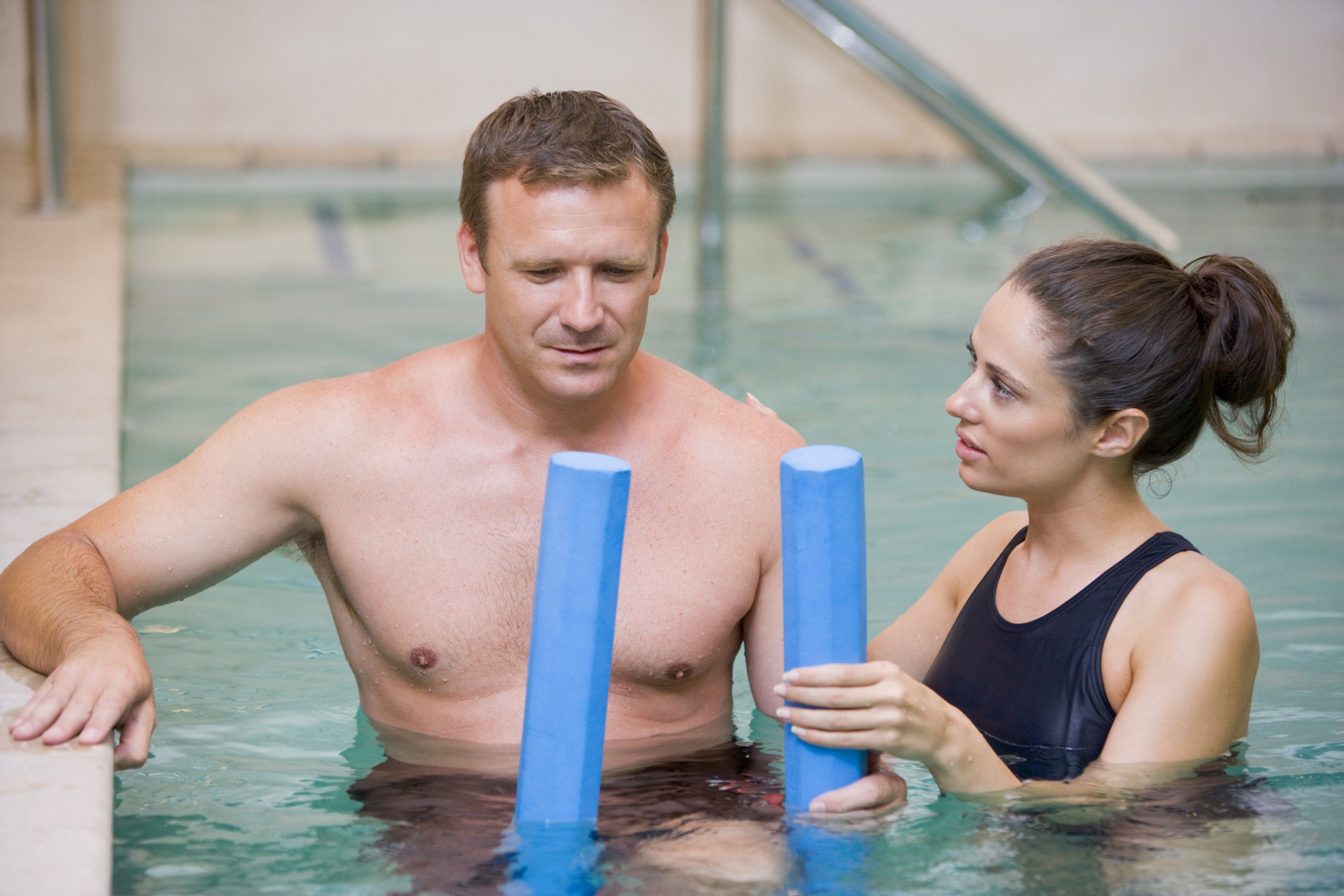Table of Contents
ToggleWhat is Hydrotherapy?
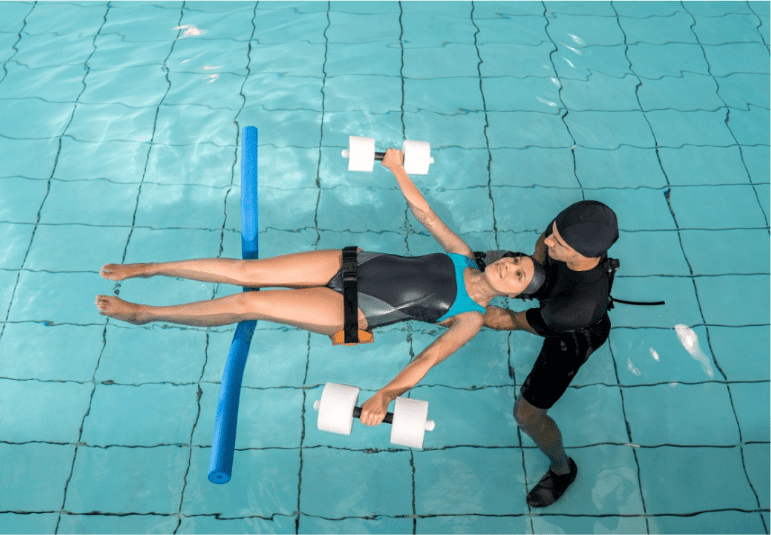
Hydrotherapy, also known as Aquatic Physiotherapy, is a tailored water-based exercise program that uses mobilising techniques prescribed and monitored by a physiotherapist.
At Sports Focus, our hydrotherapy treatments are available at our Mount Pritchard clinic as private 1-on-1 sessions, or as classes.
Hydrotherapy uses the buoyancy and resistance of water to decrease pain and swelling and increase function, strength, and range of movement. This form of therapy is used to treat orthopaedic, spinal, and arthritic conditions as well as sports injuries and neurological conditions.
If you think you may benefit from hydrotherapy, please contact our clinic at 8786 0666 and request a hydrotherapy session. We accept private bookings, workers compensation, CTP claims, DVA referrals, and EPC Medicare referrals.
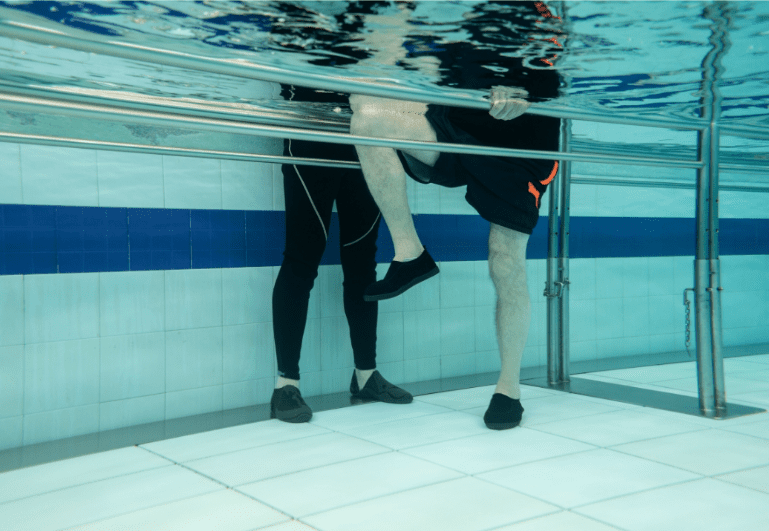
How Can Hydrotherapy Help Me?
Hydrotherapy at Sports Focus can help you in numerous ways, and its benefits are extensive for so many individuals. Hydrotherapy can:
- Reduce joint stress: By taking advantage of the buoyancy of water, hydrotherapy can reduce stress on your joints, particularly useful for individuals who are dealing with arthritis or joint pain caused by injury;
- Alleviate pain: The warmth of the water is also beneficial as it relaxes your muscles, reducing pain in injured areas;
- Improve circulation: By being submerged in water, blood circulation to your body improves, helping to decrease swelling and enhance the movement of your muscles and joints. This ultimately improves your flexibility and mobility.
- Assist with injury rehab: Hydrotherapy is an excellent option for individuals recovering from soft tissue injuries and for post-operative rehabilitation patients. It’s also great for individuals with chronic pain conditions, arthritis, or those who find exercising on land challenging.
Are There Any Contraindications for Hydrotherapy?
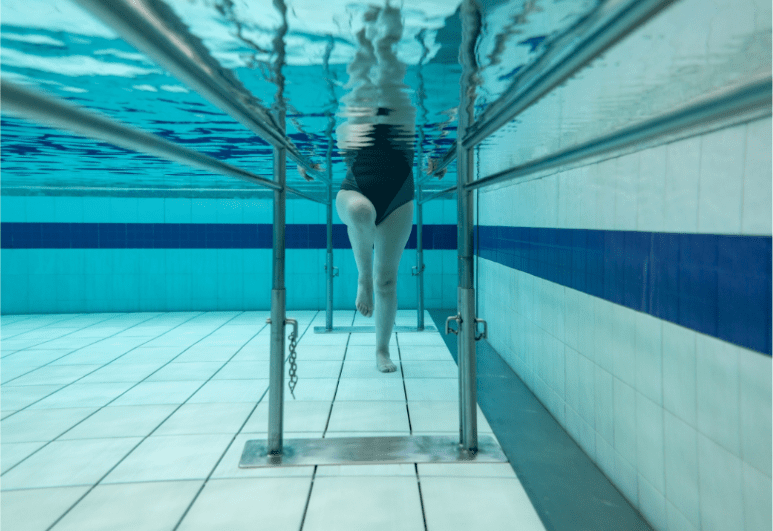
While hydrotherapy offers numerous benefits, it’s important to be aware of certain contraindications for participating in hydrotherapy sessions. At Sports Focus, your safety and well-being are our top priorities. We therefore advise against engaging in hydrotherapy if you’re experiencing any of the following:
- Feeling unwell: If you’re currently feeling unwell. Such as having a fever, flu-like symptoms, or any illness that affects your overall health and well-being, it’s best to postpone your hydrotherapy session. This is to ensure that you don’t put additional stress on your body and allow it to recover fully before engaging in physical activities.
- Bladder or bowel leaks: If you experience bladder or bowel leaks, hydrotherapy may not be suitable for you at the moment. Consult with our skilled physiotherapists to evaluate your condition and determine the appropriate timing and course of treatment.
- Urinary tract infection: In the case of a urinary tract infection (UTI), participating in hydrotherapy can exacerbate your symptoms and potentially spread the infection. It’s crucial to seek medical treatment for your UTI and complete the prescribed course of antibiotics before considering hydrotherapy.
- Open wounds: If you have any open wounds, including cuts, abrasions, or sores, we recommend that you avoid hydrotherapy until the wounds have fully healed. Immersion in water can increase the risk of infection and delay the healing process.
Additionally, we ask that you get clearance from your GP if you have any of the following conditions before starting hydrotherapy:
Hydrotherapy at Sports Focus
At Sports Focus, our expert physiotherapists will create a personalised hydrotherapy program that addresses your specific needs and goals providing you with a safe, and supportive environment for optimal healing and recovery.
We offer individual and group classes for hydrotherapy at our Mount Pritchard clinic from 7 am to 9 am every Tuesday and Friday morning. Although the class is a group class, each patient has their own exercise program designed around their individual needs.
Your first consultation will consist of an assessment followed by a beginner-level exercise program prescribed specifically for your injury or condition. You’ll also need to wear a swimming cap in order to participate in the aquatic therapy, which ensures your and others’ hygiene. Depending on your progress during therapy, a progression from hydrotherapy to land-based rehab may be suggested.
Is There More Than One Type of Hydrotherapy?
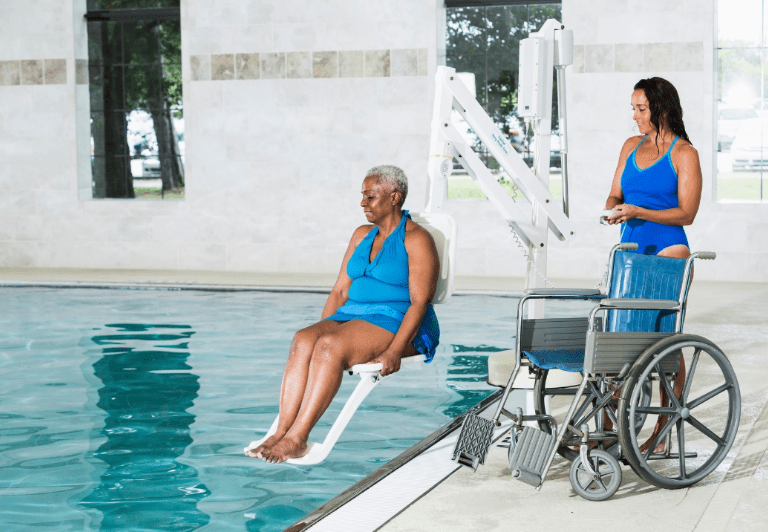
Yes, there are different types of hydrotherapy[1]. Some forms might be better suited to different conditions or injuries, and each consists of its own unique benefits. Some common types include:
Aquatic Exercise
This encompasses activities such as water aerobics, lap swimming, and group exercise classes conducted in the water[1]. Aquatic exercise provides a low-impact workout that is gentle on the joints while still offering cardiovascular and strength-building benefits.
Aquatic Physical Therapy
Also known as aquatic physiotherapy, this type of hydrotherapy involves specific exercises and techniques performed in a pool under the guidance of a physiotherapist[2]. It is particularly beneficial for individuals recovering from injuries or musculoskeletal conditions.
Sitz Baths
Sitz baths involve sitting in warm water that covers the genital and rectal areas. This type of hydrotherapy can be helpful for relieving discomfort in the pelvic region, soothing hemorrhoids, and promoting healing after childbirth or surgery[2].
While some physiotherapy clinics may offer sitz baths, this type of treatment can actually be done yourself at home if you have a bathtub. Before creating your own sitz bath, be sure to consult with your health specialist to ensure your conditions or injuries are suited to this kind of treatment.
Wet Saunas
Wet saunas utilise moist heat or steam rather than dry heat. The warm and humid environment can help relax muscles, improve circulation, and promote detoxification[3].
It’s important to note that the choice of hydrotherapy will depend on individual needs and the recommendation of a healthcare professional. At Sports Focus, our experienced physiotherapists will assess your condition and guide you in selecting the most appropriate type of hydrotherapy for your specific needs.
FAQs
Do I need a doctor’s referral to come to hydrotherapy?
No, you do not need a referral from a doctor to attend hydrotherapy as a private patient. If you have a CTP or Workers Compensation claim you will need a referral from your nominated treating doctor. If you have a gold card from the Department of Veteran Affairs you will need a doctor’s referral.
What should I expect from my first hydrotherapy session?
During your hydrotherapy appointment at Sports Focus Physiotherapy, you will have an initial assessment with our aquatic physiotherapist to create a personalised exercise plan.
Each hydrotherapy session typically lasts for 30 minutes and includes pool-based exercises. Your progress will be closely monitored, and adjustments will be made as needed. Our goal is to provide a comfortable and supportive environment to help you reach your desired outcomes.
Are hydrotherapy and aquatic therapy the same?
Yes, hydrotherapy and aquatic therapy are generally considered to be the same thing – we simply use the terms interchangeably.
Both terms refer to the use of water as a form of therapy, exercise, or rehabilitation to promote healing, relieve pain, or improve physical function.
What do I need to bring to hydrotherapy?
You will need to bring a swimming costume, a swimming cap, and a towel. There is a water dispenser at the pool, however, if you like you can also bring a water bottle.
What if I can’t swim?
Hydrotherapy does not involve swimming. The pool has both a shallow and deeper end. If you are unable to swim, you can stay in the shallow end where you’ll be able to stand comfortably. There is also a set of stairs or a ramp leading in and out of the pool with handrails for accessibility.
What if I wear glasses or contact lenses?
If you wear glasses or contact lenses, you can keep your glasses on or your contact lenses in as your head will not be going below the water.
Sources
[1] Types and Health Benefits of Hydrotherapy – Cleveland Clinic
[2] Hydrotherapy: What It Is, Benefits & Uses – Cleveland Clinic
[3] What Is Hydrotherapy? Types, Treatments, and Benefits – GoodRx
This article was last reviewed on 20/10/2023

